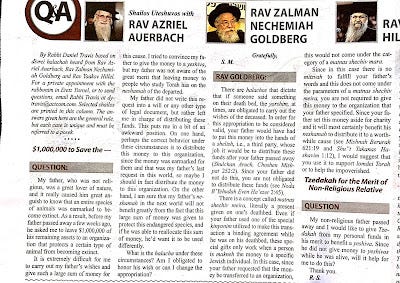Disobeying Dad's Dying Wish

There was an extremely upsetting halachic responsum which appeared in last week's Yated Ne'eman. It was all the more distressing because it was quoted in the name of Rav Zalman Nechemia Goldberg, who is generally respected as a very wise and sensible person. In his defense, I will point out that we have no idea as to the framework within which the question was presented and answered - whether the questioner sat with him to discuss it properly, and Rav Goldberg wrote the answer, or whether the questioner grabbed him after mincha for a few seconds, gave him the bare outline of the question, and "processed" the answer.
With that prelude, let us get to the responsum. It is to a person whose non-religious father, before passing away, asked his son to donate his funds towards wildlife conservation, and not to a yeshivah, as his son had requested. Here is the question and answer (click to enlarge):

The son is told that he can disobey the wishes of his dying father and give the funds instead to a cause that his father did not want to give to!
Here's the crux of the problem (and I confirmed this with a Posek who specializes in wills, Rav Menachem Copperman): The answer does not deal with the difference between the letter of the law and the spirit of the law. Or, as the Posek that I consulted presented it: The answer deals only with what one is absolutely legally obligated to do, not with what is the right thing to do.
According to the letter of the law, it is indeed true that such a dying wish is not legally binding, since it does not fulfill the various technical requirements. However, there is still a principle that it is a mitzvah to fulfill the wishes of a dying person, especially in a case where it is grounded in the fundamental principle of kibud av, honoring one's father. As Ramban notes, the Torah says V'asisa hayashar vehatov, one should extrapolate from the Torah's general principles to do the right thing in a case which is not technically covered by the law.
Surely the right thing is for this person to honor his father's dying wish. It's not as though the father wanted the money to go to a bad cause, or even to a cause with no value. I don't personally give my charity dollars to conservation organizations, but respecting and preserving God's creations should certainly be considered a legitimate cause, even by charedi standards. It's even mentioned in the Midrash that God charged Adam with the task of looking after the world and not damaging it. There are numerous further sources as to the importance of respecting the natural world, as discussed in my unfortunately out-of-print book Man & Beast, such this from Tomer Devorah:
"A person should accustom himself… to respect all creatures, since the perfection of the Creator, Who formed man with wisdom, is recognizable among them – likewise the wisdom of the Creator is in all creatures. He should demonstrate for himself that they are very, very precious, for the Creator of everything, the Elevated Wisdom, takes care of all creatures. If he were to disdain them, Heaven forbid, he is encroaching on the honor of their Creator. It is similar to a master craftsman, who made something with great skill and showed his work to people, and one person begins disparaging it and treating it disrespectfully – the craftsman will grow very angry, for by disparaging his handiwork, they are disparaging him. So, too, the Holy One; it is evil in His eyes if any of His creatures are treated disrespectfully. This is what is written, “How great are Your works, O God… You made them all with Your wisdom” – since You used Your wisdom, Your works are important and great, and a person should contemplate the wisdom in them and not disdain them."
I can certainly understand the frustration of not identifying with the charitable cause that one's parent has chosen, but that is the essence of honoring one's parents - fulfilling their wishes even when it's hard for you to do so.
What's doubly upsetting is that not only is the son told that he doesn't need to give the money to the cause that his father wanted, but that he's even told that he can give the money to a cause that the father specifically said that he didn't want it to go towards. At least give it to a cause that he'd support, such as a hospital or feeding the unwillingly poor - not something that you know he objects to! (And even if you disagree with his objection to supporting a yeshivah, surely it should be acknowledged that it is at least understandable, and that, depending on whether it is an institution for children or adults, Rambam would have had exactly the same objection!)
Imagine if a secular newspaper printed an advice column in which the dying father is an Orthodox Jew with a son who has become Reform, and he asks for his charity to go to an Orthodox Jewish day school rather than a Reform school, but the son is advised that he knows better and he should give the money to a Reform school instead. Can you imagine the reaction in yeshivah circles?!
UPDATE: A number of people suggested that this has to be evaluated from the perspective of both the questioner and the rabbi that the deceased would greatly benefit from the redirection of the funds, and that surely his neshamah now wants such a thing; and thus from this perspective, it is ethically appropriate. I think that there is some merit to that argument, and I would like to hear what others have to say about it. To my mind it still demonstrates a certain lack of humility, the same sentiment that leads people to censor the works of deceased Torah scholars on the grounds that "now that he is in the Olam Ha-Emes, he surely regrets writing that."


